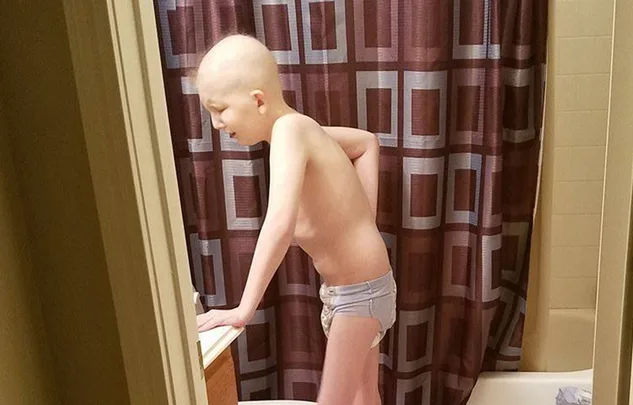Having your child succumb to serious illness is, quite literally, every parent’s worst nightmare. Even the mere thought of it is heartrending and gut-wrenching.
But for too many parents and children it is not a hypothetical: it is their painful, fraught reality.
This week Jessica Medinger gave the world a rare glimpse inside that world. She shared a single unfiltered photograph of her “whole world”, her 10-year-old son Drake, with the whole world.
Drake has cancer and it’s devastating: he is thin, weak and almost writhing in pain. He doesn’t want to go on. The image of him in this state is visually confronting.
It is light years away from the innocent, joy-filled snapshots of children that our social media feeds ordinarily burst with. Which perhaps explains, in part, the collective disbelief expressed by some that this snapshot was ever shared. It is not a depiction of family life we are accustomed to seeing.
The reaction her photo garnered is exactly what Medinger pre-empted.
“Before you scream and cry ‘why would she post a picture of him’” she wrote in a post accompanying the photo. “Life is not always politically correct and pretty, it is real,” she wrote. “Cancer destroys a person.”
“This is him telling me, ‘Mummy, I’m not going to make it’. This is him not wanting to be touched, because it hurts too much, and using morphine to get through his day. This is him telling me he is scared and thinks he won’t see his 11th birthday. This is him and me, telling him that I will continue to fight for him when he can’t. This is him and me, and our world.”
Medinger is not the first parent to share a confronting image of their child on social media. Last year Andy Wheelan posted a heartbreaking photo of his four-year-old daughter, Jessica, her small body wracked with pain.
Alongside the picture of Jessica, who suffered from the rare childhood cancer neuroblastoma, he said, “With this photo I do not mean to offend or upset, I do mean however to educate and shock those that see it in it’s context,” says Whelan. “If this photograph only serves as a purpose to make people think twice about this evil and put into perspective what it does to a child then it has achieved its purpose.”
“Please I beg of you, as a heartbroken father, it is too late for my daughter, but childhood cancer needs to be cured. No family should have to go through this hell.”
Tragically, Jessica has since died.
If your child was suffering in the throes of terminal illness, would you share an image of them at their lowest ebb, with the world?
It’s an easy question to ask. It’s far harder to answer.
The truth is, for most of us, being able to examine that conundrum at arm’s length is a luxury. For parents fortunate enough to escape the fate of serious illness in their children.
How are we to know what we would – or wouldn’t – do in that perilous position?
Medinger has learned firsthand, in the most diabolical of scenarios, exactly how horrible cancer is. She knows how it looks up close and it’s nothing like the images that one-time golden girl Belle Gibson peddled about a journey that can be fought with green juice and optimism.
Because of social media Medinger has the power – and a platform – to share her reality, unfiltered. To serve as a counter point to any Instagram-fied misconceptions about the reality of cancer.
Photos of human suffering are excruciating to behold but they aren’t without power.
Think of Alan Kurdi, the three year old Syrian boy whose lifeless body was washed up on Turkish shores in 2015. Or the four year old boy who was rescued from a building in Aleppo late last year, covered in dust. Or the Napalm girl.
These images achieved what thousands and thousands of words couldn’t: they brought human tragedy unfolding into inescapable focus.
“These images achieved what thousands and thousands of words couldn’t: they brought human tragedy unfolding into inescapable focus”
Georgina Dent
In each of those cases, newspaper editors made judgement calls. In each instance, it was determined that shocking as these images were, they needed to be seen. But for every image editors do choose to show us, there are numerous others that are withheld. They are deemed too confronting, too voyeuristic, too gratuitous.
Social media is different because there is no gatekeeper. What we share is largely dictated by what a person chooses to share.
Notwithstanding the enormous complexities this presents for privacy and children, it isn’t difficult to understand why a parent like Jessica Medinger wants to share with the world a realistic depiction of the personal hell she and her son are living. As she said, it’s not pretty, but it’s real.
Are we really only ready to embrace real life when it’s pretty?
If that’s the case, it would explain quite clearly why Medinger would want to burst our bubble with a hit of truth.
There is no doubt the image of Drake Medinger is uncomfortable to see, but given that, imagine, then, how unbearable it would be to live?
HOW YOU CAN HELP
A PO Box address has been set up to help Drake Medinger and his family. Cards, gift vouchers etc are welcome.
C/O Ericka
PO Box 1725
Tomball, TX 77377-1725
You can support children with Neuroblastoma (like Jessica Wheelan) by donating to the Neuroblastoma Foundation.
 Facebook
Facebook









